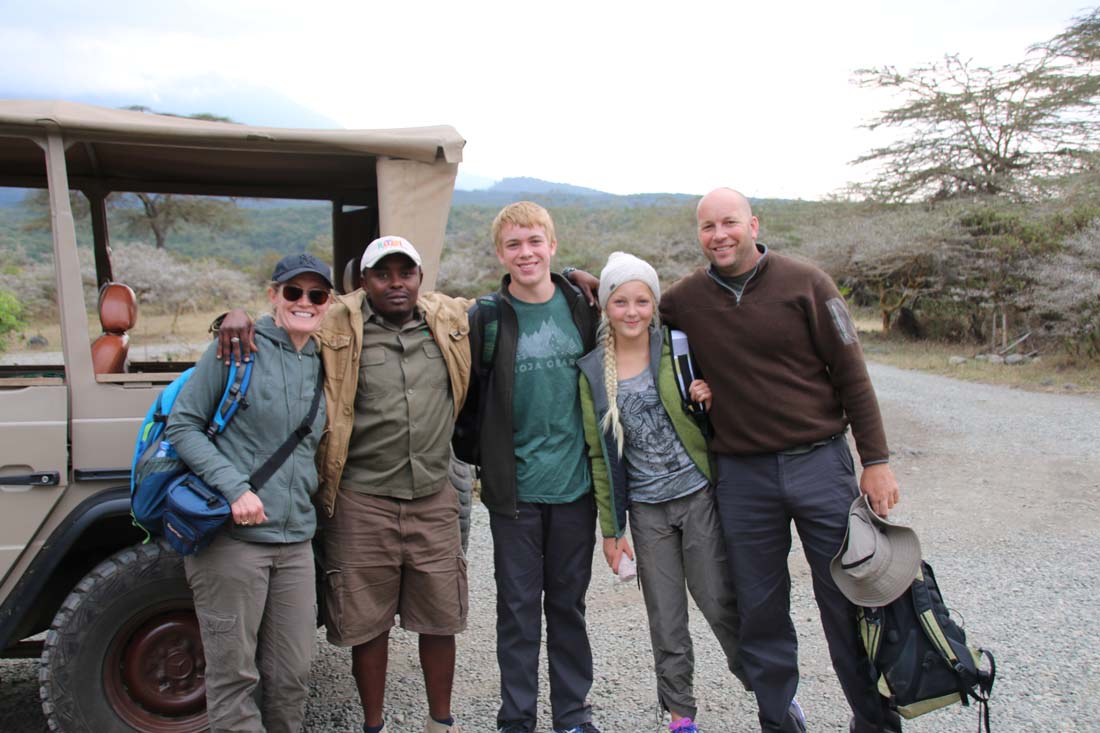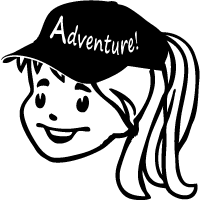 Adventuriety
Adventuriety
We saw a beautiful rainbow on the drive to Schiphol International Airport in Amsterdam. It gave me courage and I almost felt excited about the next ten days. We would fly directly to Kilimanjaro International Airport, a nine hour flight. The flight was smooth, even for my paranoid flyer standards and I got excited when I realized that the huge river below us was the Nile. Seeing the Nile made me feel like a real explorer. The sky was dark when we landed and climbed down the steps of the plane and stepped onto a different continent. It was hot and crowded in the very small airport and the first thing that greeted us as we walked off of the tarmac and into the building was a large “Ebola Screening Area” sign. That was sobering. We followed the other signs and began the process of purchasing visas, going through customs and finding our luggage.
We were met at the Kilimanjaro Airport by one of the Hatari Lodge’s drivers. He had our name on a sign and was waiting outside the small airport. It was about an hour drive to the lodge through the outskirts of Arusha. We were surprised that they drive on the left side of the road here with the steering wheel on the right side of the vehicle just like in England and Australia. I later learned from one of our guides (another blog) that Tanzania was once controlled by Germany (negative) and then England (positive and explains the driving). It was very dark, but we could see people walking along the road and buildings. We arrived at the lodge and were magically met by staff members and a group of Masai. Our luggage disappeared down a dark path and we were led by flash light up another path to the lodge. We were greeted by Diana, the manager of the lodge and she gave us the lodge “orientation” something that became a familiar activity at each place we stayed.
We were tired and disoriented and completely at the mercy of drivers and guides and camp managers. We had absolutely no idea where we were or what we were supposed to do. It was an unsettling feeling to be entirely dependent on strangers so far from home, just a bit out of my comfort zone. Diana explained that we could not wander around the property after dusk without the Masai to protect us from the animals. Buffalo can be very dangerous, often killing people in the nearby villages. They would escort us from our room to the main lodge after sunset and before sunrise. All we needed to do was to step outside the room and call “Masai!” and they would come and walk us to the lodge. Don’t drink the tap water or brush your teeth with it and be aware of your surroundings at all times (this became familiar as well). If you leave your doors or windows open the monkeys will get in and play with any body lotion that they can find and make a mess of all of your things. Last of all, what time would you like your wakeup call? Let me pause for a moment here.
This was part of our “family cottage” at the Hatari Lodge.
We have been on a different schedule the last six weeks and one that seems to fit everyone well. We stay up later and get up later. It works for the kids, they like sleeping in a bit; we fit school and activities in throughout the day and evening and often have a late dinner followed by a walk or a game of cards. In all my safari research and safari worry, I never considered the schedule but I learned something that although is “duh!” it never crossed my mind. Let me review it here for you; animals move around in the morning and evening and rest in the afternoon. Yes, it is that simple. Therefore, on safari one must do as the animals and get up with the sun. The redeeming factor here was something I’m taking home with me and training Scott to do. The “wakeup call” is someone knocking on your door with a tray of coffee or hot chocolate or orange juice or whatever you like to drink in the morning and a plate of cookies. It makes getting up almost something to look forward to and I am a morning person. It definitely helped pry the kids out of bed in the morning.
Scott and I were admiring the new landscape and discussing the strange noises that we had heard during the night long before the wake-up call that first morning. Our first day in Tanzania would be spent on a game drive and hike near Mt. Meru in Arusha National Park. We extricated the children from their beds and walked to the lodge for breakfast.
Peterless, our guide met us at breakfast and we drove the short distance to the Arusha National Park gates to get our permits and pick up our ranger, Clever. We were going on a hike along with our game drive. There are water buffalo in the area and they can be very dangerous. The rangers also watch for poachers and signs of poachers.
We hiked for about an hour. The clouds were low and the temperature cool. We turned around at a cross standing between two trees. Clever told us that there is a tribe in the area that prays to the mountain and likes to bring chickens as gifts to the gods. Once the area became a national park, this was no longer allowed but the cross remains and Clever told us that the tribe still visits the cross to pray and bring gifts even without permission.
It is difficult to describe the excitement of seeing beautiful animals in their natural habitat for the first time. It never stopped being exciting, but that first game drive was something special.
Black and white Colobus monkeys
Olive Baboons
Dick-Dick Antelopes, a small Antelope which became Grant’s favorite animal. They are called “Good Christians” because they mate for life. They are territorial, marking their area by rubbing the glands beneath their eyes on sticks and shrubs. Their defense mechanism is their ability to be utterly motionless.
Blue Monkey
We stopped to admire a giant fig tree and we had a picnic near a pristine waterfall.


We dropped Clever off at the ranger station and as we drove towards the lodge we encountered a journey of giraffes, over fifteen giraffes going somewhere right along the road.


We arrived back at Hatari lodge in time to enjoy the watching the Buffalo in the grassy area in front of the viewing deck.
These Buffalo were old bachelors and liked to graze near the lodge while the younger buffalo stayed in the forest.
We enjoyed dinner with the other guests staying at the lodge. Part of the safari experience is meeting other people on safari and chatting about your day and your experiences. Of course, you can choose to dine privately and skip the pre-dinner campfire and drinks, but it is a nice way to end the day. The kids even liked it and looked forward to sitting with someone new each night, away from their parents and often each other. It made me so proud to watch them listening and talking to new people from all over the world. Often, a guide from the lodge or traveling with a private group will join the dinner table. On this night, I listened to the kids speak Spanish with a German group’s private guide. His name was Isaac and although Spanish was his 4th or 5th language after Swahili, English and Portuguese, he spoke it fluently. He spoke a little German and French too. He was charming and patient and the kids had fun practicing their Spanish with him. Ashley was making jokes about Weissbier with a German couple that spoke no English (they were laughing because of course they understood Wiessbier and I explained to them that we enjoyed hiking with our Wiessbier). The kids had learned a few Swahili words and I heard “asante” and “karibu” come out of their mouths politely to the staff throughout dinner. As apprehensive as I was about being so beyond my comfort zone and so far from home, this is what I had wanted. There was so much newness to take in, people and sights and tastes, even the air was different. It is a powerful thing to be exposed to so much newness at once, maybe that is how babies and children learn so quickly. I could learn a lot in the next ten days, I could already feel my mind expanding.
Leaving the Hatari Lodge, Mt. Meru in the distance.
I loved this saying on the wall in the Hatari Lodge by Alfons Pillach. I wanted to learn more about Pillach and after some googling I still don’t know much. He is a modern German author, poet, musician and world traveler. I didn’t find one English website with information about him so I relied on translated pages and even then I could not find much more than partially translated poetry. Regardless of who is is or what he stands for, I really like these words, especially the part about looking into each direction, “even if it causes you dislike.” That is not easy or comfortable to do, especially when the direction is into a mirror. As our Tanzanian journey continued, I found myself collecting and reflecting on many different pieces of a puzzle that I was gathering through sights, sounds, conversations and interactions and experiences in this new place.
Comments
Comments are closed.
















Habari (Hello) Daisy, greetings from Hatari.
Hi Diana! Hope all is well at Hatari. Good to hear from you!